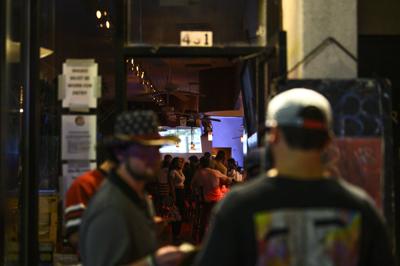The Athens-Clarke County Mayor and Commission came to a settlement agreement with local bar owners over a lawsuit filed on July 30. The lawsuit asked for an injunction against enforcing a new last call at 10 p.m. and the county’s COVID-19 emergency ordinance. Per the settlement and amended ordinance, the new last call time to sell alcohol is now 11:30 p.m.
As bars and restaurants in Athens have endured closures, limited business through the summer and losses in millions of dollars, the owners who filed the suit were concerned in part over loss of more business due to the previous ordinance’s last call time.
Jarrod Miller and Kim Long both felt the order was an attack on their businesses. Miller is the chief operating officer for 1785 Bar and Grill, On the Rocks and Moonshine, and Long is one of the owners of Flicker Theatre and Bar.
“It would not have been hard to have a staffer collect the information and reach out to all the liquor license owners and talk about the issues that they faced and ways that we can creatively handle this, and they're [Mayor and Commissioners] the ones who screwed up,” Long said about the previous ordinance.
The mayor and commission met in an emergency meeting this morning scheduled for 8:15 a.m. before entering an executive session to discuss the terms of the settlement. They voted on the settlement and a change in the local emergency ordinance.
“It's enough to to make people go, fine, but it's nothing to really jump up and down and say, ‘Yay we won!’” Miller said about the settlement.
Terms of the settlement include moving the last call time from 2 a.m. to 11:30 p.m, amending the previous emergency ordinance, which called for the time to be moved to 10 p.m. However, the time to clear patrons out of the bars has been reduced from 45 minutes to 30 minutes, meaning bars will need to be cleared by midnight.
Additionally, license holders for liquor, beer and wine whose fees were previously reduced to $1,500, $450 and $450 respectively will now be able to pay the reduced rate for both fiscal years 2021 and 2022.
Lastly, restaurants and bars pay a 3% excise tax on liquor sales, which can incur interest and penalties. Per this settlement, those penalties and interest will be waived by the county manager.
It was also agreed that the mask mandate, as passed by the mayor and commission, would still be in effect.
This agreement, particularly the last call time, is to be in effect until five days after the state of judicial emergency has expired. Attorney Judd Drake explained that once the courts are open and fully operational, then the bars can be as well.
The current state of emergency is set to expire on Sept. 10; however it could be extended. The terms of the settlement agreement state that the order would expire after five days.
“What do they say, a good compromise means that no one’s happy, right?” Miller said about the terms of the settlement, acknowledging it was the best of a situation he did not want.
Though both the ordinance and settlement were passed unanimously, some commissioners were not necessarily happy either.
“So folks need to know the risk they're taking, and these folks that have brought this suit have refused to any measures whatsoever to curb the spread. They do have blood on their hands,” said District 3 Commissioner Melissa Link, whose district includes the downtown area.
Her reluctance was also matched by District 7 Commissioner Russell Edwards, who said he supported the settlement but was “not completely satisfied with the result.”
“They’re [bar owners] more interested in making money than they are in protecting the public health, and I think that’s pretty pathetic,” District 8 Commissioner Andy Herod said
Per the settlement agreement, the plaintiffs filed a motion to dismiss the suit and agreed to not file a lawsuit on the revised bar ordinance, the mask ordinance or any extension or amendment to the mask ordinance. The attorney for the plaintiffs said the motion to dismiss was filed prior to the evidentiary hearing.
This information was conveyed to the judge in the delayed hearing a little after 9:30 a.m. this morning. Chief Judge Eric Norris said he will terminate his temporary restraining order on the now amended order on last call time once the motion to dismiss appeared in the system.
Mayor Kelly Girtz said that while the mayor and commission felt as though it had a strong case, there were concerns over the potential new executive order Gov. Brian Kemp is set to enforce, according to The Atlanta-Journal Constitution. The order will specify that cities cannot mandate private businesses to require masks.
Additionally, a large concern was over the University of Georgia’s student undergraduate population returning to Athens, which is why the mayor and commission wanted to quickly settle the suit, Girtz said.
“I have the benefit of 25 years of time in bars in this town, and the reality of young people under the influence of alcohol is that regardless of any capacity arrangement or seating arrangement, compliance is near impossible,” Girtz said.
Miller said he understands the state of the pandemic and the issues of spreading the virus, but he is also aware that when students do arrive back in Athens, if they are unable to go to bars at their choice of time, they may just forgo partying downtown and choose to do so elsewhere.
“There's going to be an explosion of house parties, and my fear is that this spread is going to happen,” Miller said “You're going to put way more stress on the local police because now they have to go all over the map.”


